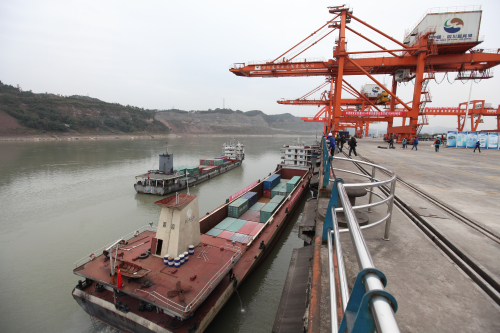|
 |
|
BON VOYAGE; A fully loaded ship departs the Yibin Port in southwest China's Sichuan Province on December 16. The first foreign trade route of the port was open to traffic that day, and ships can go from the port to deliver goods to international ports such as those in Japan and South Korea (ZHUANG GEER) |
All Aboard!
China's CSR Corp. Ltd., one of the country's two leading rolling stock manufacturers, has secured a contract worth 1.7 billion yuan ($278 million) to supply locomotives and rail cars to Argentina, CSR said on December 15.
CSR's locomotives and trains will be used on Argentina's Belgrano Cargo Railway Rehabilitation Project, in which China Machinery Engineering Corp., a state-owned international engineering and trade company, is the main contractor.
The contract included 80 locomotives and more than 2,000 freight rail cars, said CSR.
CSR said it has become an important supplier of locomotives and rail cars to the South American country. Supply services began as early as 2006.
Private Banking
The China Banking Regulatory Commission (CBRC), the country's top industry watchdog, has approved the operation of private bank Webank, a major step in deepening financial reform.
Webank has a registered capital of 3 billion yuan ($490 million), and its business scope includes personal banking, corporate banking and international banking, said the CBRC on December 12.
In the third quarter of this year, the CBRC gave the go-ahead on the establishment of five private banks including Shenzhen-based Webank and Hangzhou-based MYbank in a bid to better support the country's small and micro businesses.
Webank, partly funded by Chinese Internet giant Tencent, is the first among them to open its doors to clients.
China-GCC Ties
China and India are poised to become the biggest trading partners of the six Arab oil states of the Gulf Cooperation Council (GCC) countries, said a report released on December 16 by the Economist Intelligence Unit (EIU) and Dubai-based Falcon and Associates.
According to the EIU report, China will be the largest export market for the GCC countries by 2020. The six GCC countries are Saudi Arabia, Kuwait, Bahrain, Qatar, the United Arab Emirates (UAE) and Oman.
"Between 2010 and 2013, GCC-China trade grew faster than with any other significant trade partners," said the report.
Chinese investment is also rising in construction and wholesale trade and retail, with over 3,000 Chinese companies registered in Dubai, up from only 18 in 2005.
The UAE is home to 270,000 Chinese nationals, most living in the Emirate of Dubai.
The four major Chinese banks—Industrial and Commercial Bank of China, Bank of China, China Construction Bank and Agricultural Bank of China—have been setting up branches in Dubai since 2008.
Meanwhile, the two biggest UAE lenders, Emirates NBD from Dubai and National Bank of Abu Dhabi, expanded their offices to the Chinese mainland.
Scrutiny Over SOEs
On December 16, China's graft authorities pledged to step up regular internal inspections on state-owned enterprises (SOEs).
Hao Mingjin, Vice Minister of Supervision, told an online press conference to expect more internal inspections at SOEs.
Since 2013, the central leadership has dispatched inspectors to ministries, provincial governments, SOEs and public institutions.
Six SOEs have so far undergone inspections and, in the latest round, another three—China State Shipbuilding Corp., China Unicom and Sinopec—will come under scrutiny.
Serious corruption issues remain in SOEs, including abuse of power and bribery, Hao said.
Chief executives at state-owned enterprises have been identified as being in "high-risk" positions and, should it be proved they are embroiled in graft, it is highly likely their subordinates are also involved, creating a graft gang, he said.
Many corrupt executives have abused their power to facilitate private companies run by their relatives, and some of their illegal decisions have led to serious state losses. | 